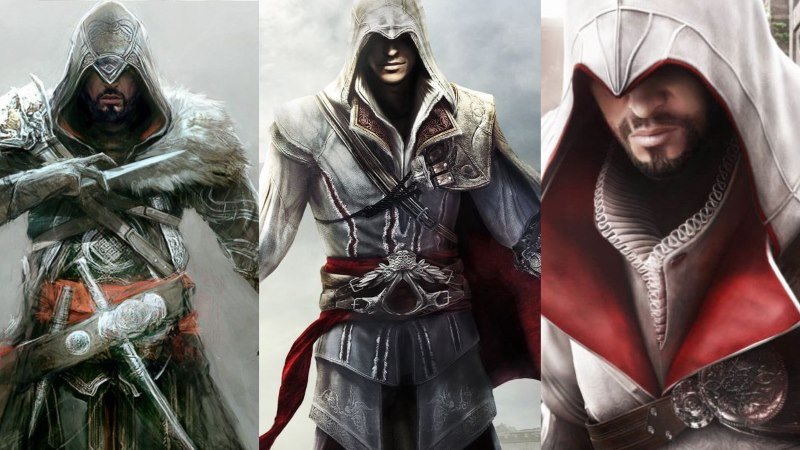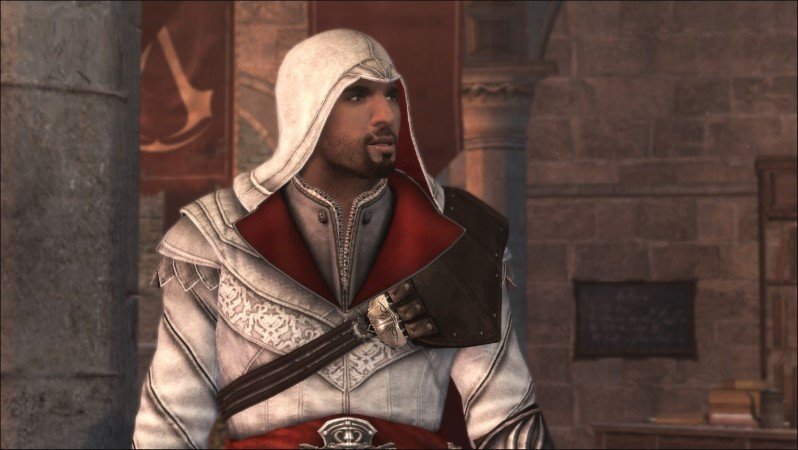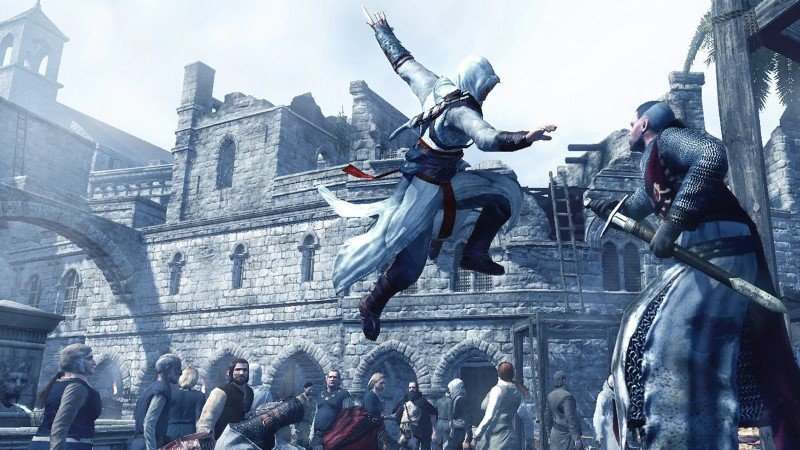The Assassin’s Creed games had two main parts. The first part started in 2007 with the first game. This went on until the game called Assassin’s Creed Syndicate in 2015. In this first part, the games introduced players to a cool world of historical assassins with interesting stories and new ways to play. They also created famous characters and set the base for the whole series. After Assassin’s Creed Syndicate in 2015, the second part started. It brought new ways of telling stories and took players to different places, making the games even more exciting.

What Started it All!
The Assassin’s Creed series initially followed a consistent style with familiar game features and mechanics. But things changed a lot in 2017 with the release of Assassin’s Creed Origins. This game focused more on action-RPG elements and started the second phase of the series. It brought a new way of playing and looking at the games. With the recent release of Assassin’s Creed Mirage, it seems like a third phase might start. The series keeps changing, giving players new and exciting stories and ways to play. This shows how the games can adapt and stay interesting for a long time.
Critical Acclaim
Assassin’s Creed Valhalla received praise from critics, but it marked a significant change for many long-time fans. The move towards big, lengthy action RPGs that take around a hundred hours to complete didn’t sit well with everyone. This shift created a split among the fanbase. People who loved the original Assassin’s Creed style found it hard to connect with the series after the release of three consecutive games with this new approach. The different gameplay style made some fans feel like the series was moving away from what they loved. This situation highlights the difficulty of finding a balance between different games. The concept required bringing in new ideas and meeting the expectations of a diverse and dedicated player community.
To regain fans who were disappointed, Ubisoft released Assassin’s Creed mirage. While this was a positive step, Mirage doesn’t fully capture the spirit of the original Ezio trilogy. Even though it tries to make amends with long-time fans, some still feel it doesn’t match the nostalgic greatness of the iconic Ezio trilogy. The franchise faces the ongoing challenge of finding the right balance between introducing new ideas and maintaining the timeless charm of its classic beginnings. As Ubisoft deals with changing player expectations, the quest to reconnect with the magic of past successes continues for the Assassin’s Creed series.
Ezio’s Assassin’s Creed Trilogy Still Holds Up
Revealed between 2009 and 2011, the Assassin’s Creed Ezio trilogy might seem a bit dated now. Still, we believe it has lasting appeal that remains strong. Despite not meeting current visual standards, especially Assassin’s Creed 2, the trilogy is praised as a high point in the series. Nostalgia plays a big part in this praise, but the trilogy’s strong story and gameplay are noteworthy. Assassin’s Creed 2, in particular, is often considered one of the best in the franchise. It proves that a captivating story and innovative gameplay combination can create an enduring experience. This experience still resonates with fans even after more than a decade.

Improved Combat and Mechanics
Assassin’s Creed 2, surpassing its predecessor, takes the franchise to new heights. It comes with improved combat mechanics and a more seamless and intricate parkour system. Expanding on this success, assassin’s Creed Brotherhood continues to refine these aspects, and Revelations follows suit. The result is a gameplay experience that stands strong even after a decade. The trilogy’s dedication to constant improvement is clear, offering players a smooth evolution of combat and parkour mechanics. This lasting excellence demonstrates one important aspect. It is critical to show how a careful progression of gameplay elements can contribute to the enduring appeal of a gaming series. This solidifies the Ezio trilogy’s reputation as a benchmark in the Assassin’s Creed franchise.
Gripping Story
One of the remarkable features of the Ezio trilogy is its gripping story and memorable characters. While the plot of Assassin’s Creed 2 may seem simple, its powerful mix of personal stakes and a captivating revenge journey keeps players hooked from beginning to end. The emotional depth and impact of the story overshadow its apparent simplicity. This simplicity still creates a solid foundation for the trilogy’s overall narrative.
The Ezio trilogy’s talent for crafting engaging stories with well-rounded characters plays a crucial role in its lasting popularity. It shows that the emotional impact of a narrative can be more important than complexity. Such a narrative leaves a lasting impression on the gaming experience.
In Brotherhood, the story becomes more complex, adding some intricacy while focusing on personal drama to engage players.
Revelations continues this trend, maintaining a compelling narrative. Ezio Auditore, is arguably one of the best characters in the franchise. He is brought to life through an iconic performance by Roger Craig Smith. His portrayal carries significant emotional weight, skillfully balancing seriousness and humor as the situation requires.
Ezio’s journey, marked by growth and depth, highlights the trilogy’s success in creating an engaging plot and delivering it through characters that deeply connect with players. This adds an emotional layer to the overall gaming experience.

Aging Graphics
Although the visuals and some early gameplay mechanics of the Assassin’s Creed Assassin’s Creed Ezio trilogy may show their age, surprisingly, most of its gameplay formula remains relevant. The trilogy’s strength comes from its well-thought-out design and the advantage of being a trilogy. Players enjoy a natural and satisfying sense of progression, experiencing the improvement of mechanics and the continuation of a captivating story as they play through each game in sequence. This thoughtful structure not only adds to the lasting appeal of the trilogy but also demonstrates how a carefully crafted series can offer a gratifying and immersive gaming experience, even years after its initial release.
Assassin’s Creed Mirage Took Too Many Steps Backward
From the beginning, Ubisoft made it clear that Assassin’s Creed Mirage would go back to the classic AC formula, acting as a tribute to the series’ 15th anniversary. In response to long-time fan requests to return to the franchise’s roots, Mirage aimed to do just that. However, in its attempt to reconnect with the series’ foundations, some argue that Mirage might have taken a few steps too far back. Balancing nostalgia with innovation is a tricky challenge. While the intention was to celebrate the essence of Assassin’s Creed, Mirage has sparked discussions about finding the right balance between honoring the past and evolving for the future.

Lacks Personal Stakes
Despite its commitment to revisiting the classic AC formula, Assassin’s Creed Mirage doesn’t quite measure up in terms of story and character elements. The game lacks significant personal stakes, providing few moments for emotional investment. Critical plot points also feel rushed, reducing their impact on the overall narrative. This departure from the depth and engagement seen in previous entries raises concerns about the balance between nostalgia and the necessity for a compelling, evolving storyline. While Mirage tries to capture the essence of the series, criticisms of its narrative and character development highlight the challenges of maintaining a delicate balance between honoring the past and delivering a fresh, immersive gaming experience.
Also read: Assassin’s Creed Mirage: The Complete Guide To Khidma Tokens
Conclusion
Assassin’s Creed Mirage is receiving criticism for its gameplay, as it doesn’t meet expectations. The effort to mix the classic formula with new elements led to an underdeveloped combat system and significantly reduced parkour mechanics. While trying to bring back the vibe of the 2007 original, Mirage’s outdated gameplay doesn’t connect well in 2023. In contrast, it falls short of delivering the engaging experience offered by the more polished and sophisticated gameplay of the Ezio trilogy. This underscores the challenge of combining nostalgia with current gaming expectations and highlights the necessity of evolving mechanics to meet the standards of today’s discerning audience.

0 Comments